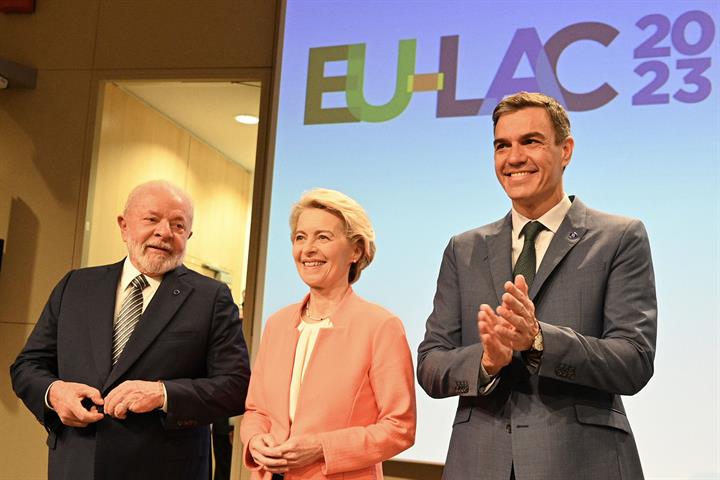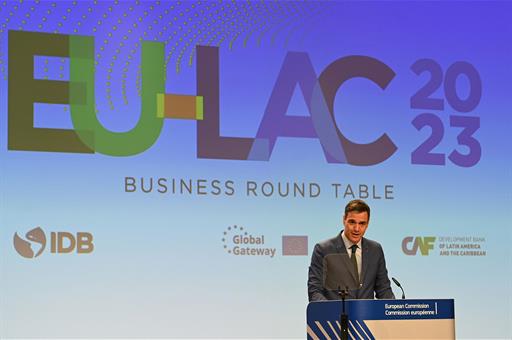Sánchez: "Europe and CELAC are in an encouraging situation to balance needs and interests in priority areas for their economies"
President's News - 2023.7.17
Pedro Sánchez highlighted the strong historical, cultural and social links between the two regions, as well as the common values and shared interests.
This meeting, organised in Brussels by the President of the European Commission Ursula Von der Leyen, was attended by representatives of the private sector from Europe and Latin America, as well as representatives of international financial institutions. In this context, the President of the European Commission has pledged an investment of 45 billion euros to launch projects related to new technologies in the countries of Latin America and the Caribbean, thus making the European Union a preferential partner for the regions.
For his part, President Sánchez stressed that the Spanish Presidency of the Council of the European Union aims to strengthen the Union's external relations, a challenge in which, he said, both Latin America and the Caribbean "have an indisputable leading role". The Prime Minister stressed that the primary objective of the Business Forum is to strengthen economic relations on both sides of the Atlantic, and focused on three main issues: Trade, a shared Investment Agenda and the mobilisation of the private sector around it.
With regard to Trade, Pedro Sánchez stressed that the European Union maintains balanced relations with Latin America, which have grown enormously between 2013 and 2022, with a 59% increase in imports and 37% in exports. So much so that the combined trade volume is currently around 300 billion euros per year. "85% of lithium resources, 40% of biodiversity and 33% of freshwater reserves are found in Latin America," Pedro Sánchez stressed, underlining the complementarity of the two economies. "Latin America and the Caribbean have an abundance of energy and mineral resources, while Europe has the capital, technology and know-how that Latin America needs for its development," he said, stressing the importance of deepening trade and economic integration agreements to make the most of these complementarities. "The ratification of the renewed EU agreements with Chile and Mexico is very close and we are confident that it will take place during our presidency," the President assured.
 Pool Moncloa/Borja Puig de la Bellacasa
Pool Moncloa/Borja Puig de la Bellacasa
Likewise, on the Free Trade Agreement between the EU and Mercosur, he recalled that after more than 20 years of negotiations, both regions have "a unique window of opportunity" to ratify it during the six-month period in which Spain holds the presidency of the EU Council. To achieve this, Pedro Sánchez insisted, it will be essential that, while being aware of the sensitivities and interests of both parties, the countries are also aware of the importance of perceiving that the costs and benefits of the treaty are balanced. To achieve this, the Spanish government is working intensively with the European Commission to bring positions closer together and reach an agreement on the Additional Joint Instrument, which will allow the environmental protection and the protection of the Amazon to be reconciled in a way that respects the sovereignty and capacities of the Mercosur countries. The completion of this agreement, President Sánchez recalled, would mean that 94% of the GDP of Latin America and the Caribbean would have free trade agreements with the European Union.
In this context, the President of the Government assured that reaching bilateral agreements between the EU and the region on the harmonisation of standards, rules of origin and customs procedures would open the doors to an ambitious economic space between the two regions. "This partnership between the EU and Latin America would encompass 1.1 billion people, 14% of the world's population and 21% of GDP," he said, recalling that this would bring both regions to GDP levels similar to those of the US economy, surpassing China.
Pedro Sánchez also addressed the shared Investment Agenda, stressing that cumulative direct investment by EU companies has increased by 20% compared to the previous year, and that Europe remains the main investor in Latin American and Caribbean countries. Moreover, Latin American companies have become an important investor in Europe, as President Sánchez pointed out. "The so-called multilatinas have invested almost 40 billion dollars per year on average in the last decade outside their region", he explained, highlighting that Spain is the leading destination within Europe for these investments.
In this context, he insisted that this strengthened economic relationship demands a greater investment effort from the European Union, "led by the public sector to accelerate the ecological transition, the digital transformation and the social agenda of the CELAC countries", he said, recalling the central role that the EU's Global Gateway initiative will play in this context, an investment agenda in specific strategic projects which, Pedro Sánchez reiterated, must be accompanied by cooperation in terms of training, transfer of knowledge and skills and the harmonisation of standards and regulatory frameworks. "Spain is committed to this agenda and, for this reason, we are going to mobilise 9.4 billion euros over the next few years through different public investment instruments, in addition to the 10 billion euros from European institutions," said the Prime Minister.
Finally, and in line with this investment agenda, he referred to the private sector. Pedro Sánchez stressed that European companies, global leaders in their sectors, have much to contribute to Latin America and the Caribbean, both in capital and in technology or knowledge to contribute to the green, digital and social transformation of CELAC. "Long gone are the days when Latin America was seen as a great supplier of raw materials," he said, recalling that the abundance in Latin America and the Caribbean of minerals such as lithium or copper, the sun or wind, place the region "before an extraordinary opportunity", these being fundamental for the ecological transformation in areas such as car batteries or the production of green hydrogen.
In this context, the President of the Government stressed that this shared agenda should focus on the creation of resilient value chains, the diversification of exports and the development of productive linkages between the two regions. In this way, he insisted, mutual benefits will be generated in a balanced way. Pedro Sánchez also recalled that there are precedents that serve as examples for working in this direction, such as the recent memoranda of understanding between the EU and Chile and Argentina. Today, he insisted, Europe and CELAC are in an unbeatable position to match needs and interests in priority areas such as critical raw materials, digitalisation, energy, green transition, health, reindustrialisation and social cohesion.
Non official translation





